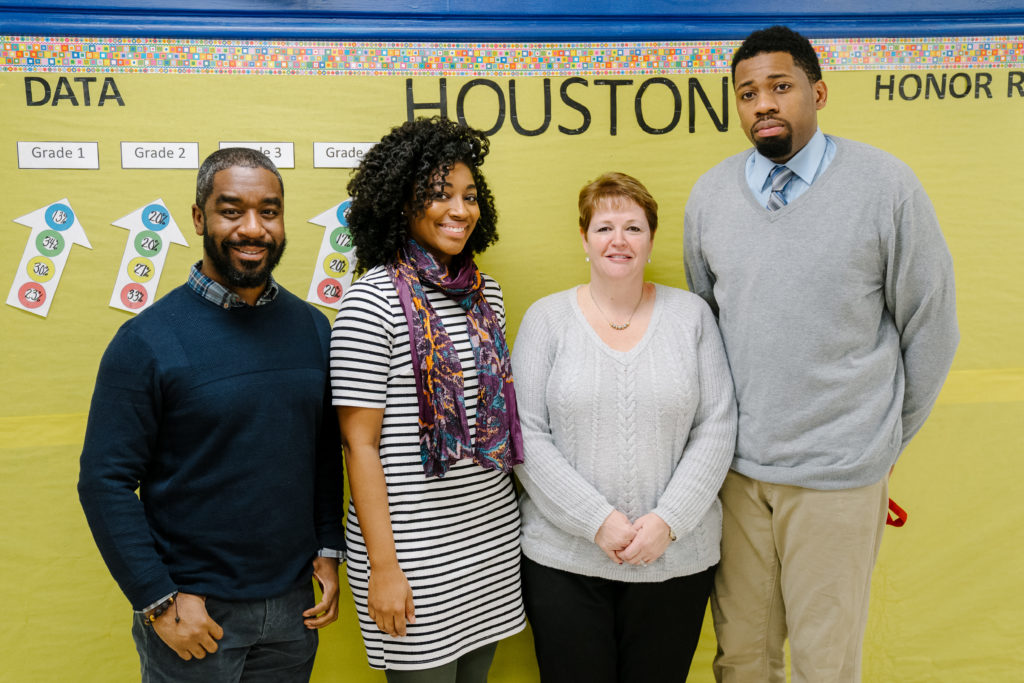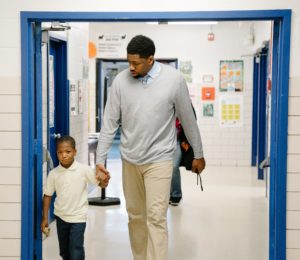December Person of the Month: Jamal Hulum

Pictured left to right: Matthew Vialva, social work consultant; Joscelyn Reed, instructional coach; Dawn Foreman, program director; and Jamal Hulum, behavioral technician.
Jamal Hulum is the Behavioral Technician at Houston Elementary School, a third-year Washington, D.C. partner school. He was nominated by Social Work Consultant Matthew Vialva for his commitment to working with Turnaround and for how much he has accomplished since starting the job in mid-September.
THE 180: First, what exactly is a behavioral technician?
JAMAL HULUM: My job is basically to make sure the school runs smoothly and take care of day-to-day behavioral issues. I meet with students and talk with them and work with teachers to understand which students may be having difficulties within the classroom. Everything I do is to make sure students can have a successful school year.
THE 180: What does a typical day look like for you?
JAMAL HULUM: A typical day starts when kids come in from breakfast at 8:10 a.m. From there, I go wherever the wind blows. I walk the halls to make sure everything is running smoothly until about 11:00 a.m. If any issues arise, I just try to take care of them as quickly as possible. 11:00 a.m. is lunch time for the early childhood students, then each grade comes after that – kindergarten, first, second and so on. At dismissal, I’m around to talk with parents who might have concerns or share updates about their kid’s behavior. It all comes down to making sure students have a successful year, without extra stress on the teachers, parents or the kids.
THE 180: What kind of behavioral issues do you address?
JAMAL HULUM: Kids roaming the hallways, disruptions in class, students not following directions. I often go into classrooms and help out by redirecting a student’s attention. A lot of times when kids act out, they just want attention. It’s my job to figure out what they need and find a way to help them.
THE 180: You started in mid-September. Was it challenging to come into the school after the year had begun?
JAMAL HULUM: Yeah, the previous behavioral tech, Mr. Wood, did a great job and for some kids, that’s all they know. It was a little difficult adjusting at first, understanding what’s what and figuring out people’s personalities and behavior. I’ve heard some stories, but like to take things case-by-case. A teacher might say, “Oh, you have to watch this student,” but until a student shows me that they need to be watched, I’m going to give them a chance.
THE 180: What value have you found in working with Turnaround’s team?
JAMAL HULUM: A lot of support. The team does a lot to try to help me move forward. They see me running around throughout the day and they’re always willing to lend a hand and help me in any way they can – whether it’s putting together a plan to make sure the cafeteria runs smoother, or putting a plan together outside of recess to make sure that all of the students are always watched. They do a great job in helping run the school smoothly.
THE 180: You mentioned a plan to make sure the cafeteria runs smoother. What did the cafeteria look like before and what plan did you establish?
JAMAL HULUM: I think the cafeteria was a little busy. I’ll use that word. It got rowdy at times because there were a lot of students in one place without much direction. I sat down with Turnaround and we talked to Principal Seaward about some strategies. For example, we moved the fifth graders to their own lunch. By creating smaller groups of students in the cafeteria, things calmed down and ran a bit smoother.
THE 180: What strategies have you learned from Turnaround that you find yourself using the most?
JAMAL HULUM: I try to use a lot of active listening, just making sure the students know that somebody is listening to what they’re saying. Sometimes that’s all they really need, somebody to listen to them. A lot of kids are just lashing out for attention.

THE 180: What is the most important thing students need to succeed?
JAMAL HULUM: Support. Not just in a school system. They need support from their parents or guardians – whoever is taking care of them. And I think the school and parents or guardians need to be on the same page. If we can get everyone on the same page, the sky’s the limit for what these kids can do.
THE 180: How do you do that? Get everyone on the same page?
JAMAL HULUM: Transparency. You’ve got to trust your school. I think if teachers and parents can talk and have an open dialogue about the student then we’ll be fine. But I think sometimes the parents or teachers each think they have the best answer. They get into a power struggle. They need to drop the rope and realize that we’re here to help this child.
So I think the most important thing is having everybody on the same page. And the way to do that is open dialogue, transparency and holding everybody accountable. Not just the student or the teacher or the parent – everybody.

Share This Story